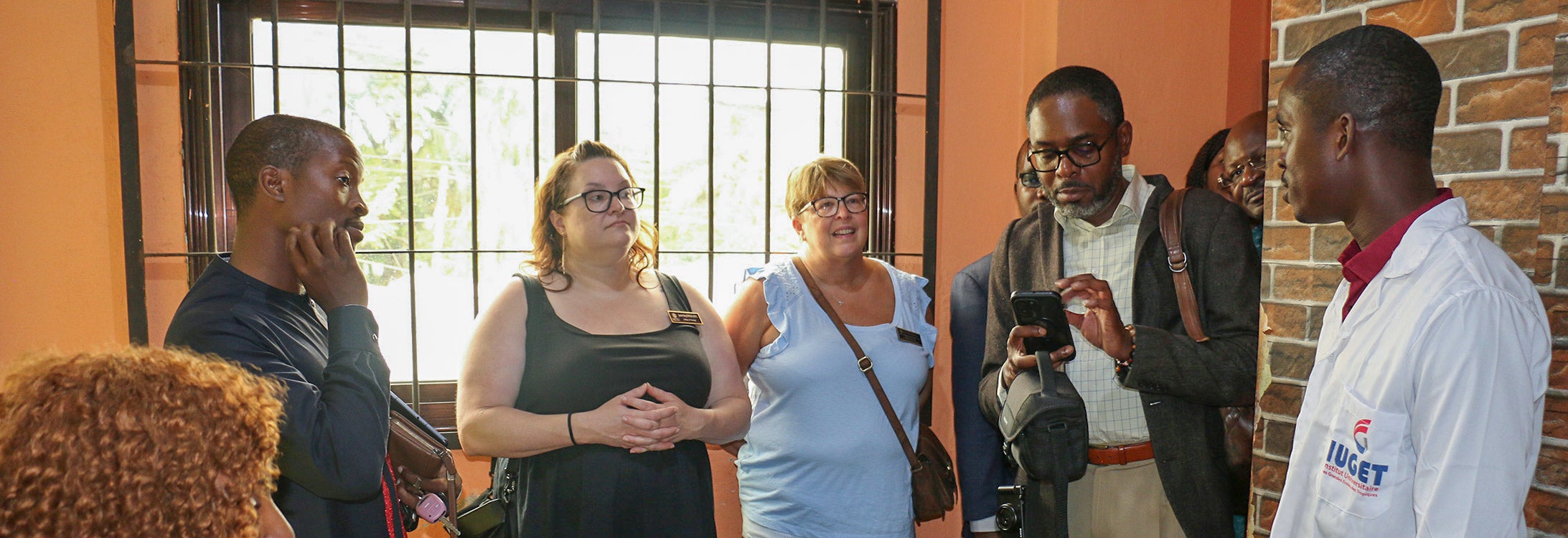Cameroon Outreach
Nursing leaders make strides to partner with West African peers
In early 2023, Jean-Emile Nguepi, the executive vice president and chief academic officer of the Institut Universitaire des Grandes Écoles des Tropiques (IUGET), a bilingual, English and French, higher education institution in Douala, Cameroon, reached out to Dr. Bim Akintade, the dean of the College of Nursing, with a request: can we meet to talk about a partnership?
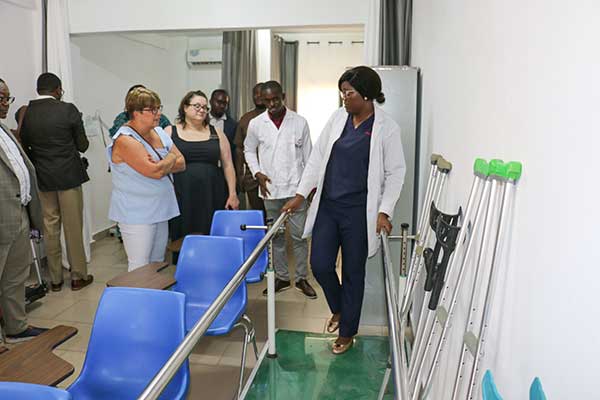
Drs. Renee Spain and Jennifer Perry tour an Institut Universitaire des Grandes Écoles des Tropiques facility to learn more about how Cameroonian nurses are trained.
Nguepi visited Greenville at the end of March and suggested a collaboration – an exploration of how the two countries might exchange talent and resources. American instructors might develop curriculum or teach classes virtually for Cameroonian students, and some of those IUGET students might travel to ECU for classes and practical training.
There was no telling what might be possible, Nguepi proposed.
Dr. Michael Jones, the College of Nursing’s inaugural associate dean for culture, engagement and professional development, was tasked by Akintade to lead a group of College of Nursing professors to Cameroon to see what was feasible.
Jones asked for volunteers and got an ideal pair of teammates to join him on an adventure to west Africa.
Dr. Renee Spain, a Greenville native and a certified nurse midwife and clinical associate professor of nursing, is one of two midwifery faculty members at the College of Nursing. One of her primary concerns is maternal and baby health in eastern North Carolina, but that same concern translates to west Africa, where maternal health is particularly precarious.
Dr. Jennifer Perry, a family nurse practitioner and clinical associate professor in the Doctor of Nursing Practice concentration, is from Hickory, graduated from ECU as a Spanish major, and returned for an international studies master’s degree. Not quite done with a Pirate education, she graduated as a family nurse practitioner in 2014 and then earned her doctoral degree five years later.
Spain volunteered because of her background with birthing care. Perry’s international experience and travels have taken her “many different places and I’m always willing to go.”
In October, just a few months after a partnership was proposed, Jones, Spain and Perry boarded the first of many planes enroute to West Africa.
Improving Health Care in Cameroon
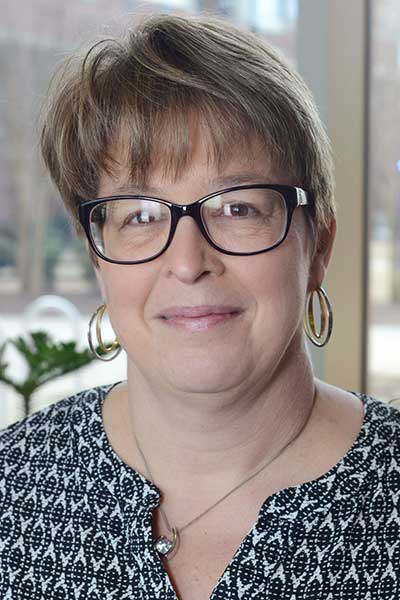
Dr. Renee Spain.
A 2019 study reported that since 2000 global maternal death rates have declined by more than 40%, but Cameroon has one of the world’s highest rates of maternal mortality. Like a number of sub-Saharan countries it has seen an increase in the deaths of mothers in childbirth and in the weeks that follow even uncomplicated births.
Jones equated the current state of medical care in Cameroon with that of rural areas of the U.S. 50 or more years ago.
“It’s like Mississippi in the ’60s, that reminds me of what we saw,” Jones said.
The World Bank reports that one in four Cameroonians live below internationally agreed poverty levels, but that’s not to say that treatment options are available for those with the means to pay.
“There are issues with access to care there — the haves and the have nots — but if you need to get a colonoscopy in Cameroon, you can get a colonoscopy in Cameroon. If you have the money,” Perry stipulated.
Spain and Perry both felt that their shared decades of nursing and education expertise could help their peers to train the next generation of Cameroonian nurses — to help turn those numbers around and improve health outcomes for the Cameroonian people.
“I think we need to look at how their curriculum is different from ours and what their needs are. Midwifery is very different in Cameroon than what we need here, but we still have some things in common. And I can see doing some collaborative work where their students and our students could virtually be together and share with one another,” Spain said.
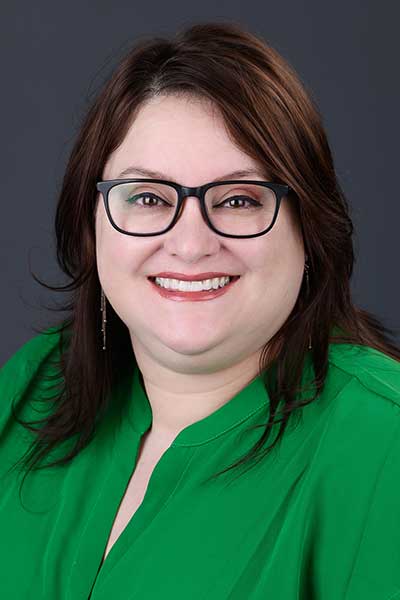
Dr. Jennifer Perry.
Spain also thinks that opportunities might exist for faculty exchanges, or helping the IUGET administration procure equipment like advanced medical simulators. The Cameroonian faculty are especially interested in incorporating high-fidelity simulation into student education, which should ultimately translate to improved training and treatment in the communities around the country.
Spain and Perry agree that there are structural aspects of Cameroonian health care delivery that are very different from the U.S. model that they may not be able to change, or even want to change. But showing the versatility and positive impact on patients that American advance practice nurses have experienced in the U.S. might give their African peers some consideration of how advanced nurse training and practice could impact Cameroonian public health.
“There was a moment where Renee and I were talking about our roles as midwives and nurse practitioners, that we write prescriptions, and the physician in the room had this flabbergasted look on his face that anybody who was not a physician could do that,” Perry said.
While research is clear that nurse practitioners improve health care outcomes, Perry said, trying to inject the concept of the advance practice nurse into the Cameroonian medical culture isn’t as important as arming their nurses with basic skills that will tackle the tragically high rates of mortality and morbidity for mothers and babies in east Africa.
“Their morbidity and mortality rates make ours look terrific and ours are horrid,” Spain said.
Educating ECU students
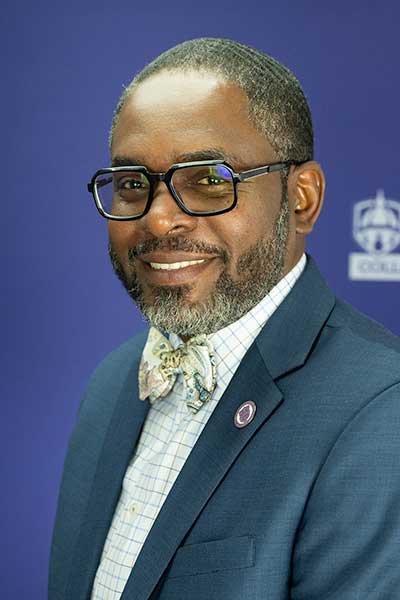
Dr. Michael Jones.
Helping improve health care outcomes for Cameroon is an important consideration, but Jones, Spain and Perry put an equal priority on what ECU, and Pirate nursing students, could get from a partnership with IUGET.
“We have to figure out what is alike and what’s different, and how can we mesh those curriculums,” Spain said. “What we need to know is what we are we going to gain, because we certainly want our students to get something out of a partnership as well. Part of that could be the global health perspectives we are trying to weave into our coursework.”
Perry said North Carolina, like many rural areas of the country, is quickly diversifying with an influx of residents who speak languages other than English or Spanish and who have beliefs different from the majority.
“For our students, there’s always a benefit to widen their perspective, and for the faculty as well. The more experiences that we have, the more practice we have, the better off we get. It might not be a measurable kind of outcome, but I do think it’s an important outcome,” Perry said.
Spain agrees, having treated patients in her clinical practice who come to eastern North Carolina from abroad and bring cultural expectations that are different than most native North Carolinians.
“I saw a patient from Ghana who had a baby. Her husband is a nurse from Ghana working at our medical center. I talked with him about nursing education, how his responsibility differs from what he was seeing here in the States,” Spain said. “If we can give our students a wider perspective and somehow weave that into our courses, that’s going to help.”
In October, the college received a federal grant for ECU’s midwifery program – nearly $1 million a year for four years – to increase the number of trained midwives and to increase the social diversity of graduates who indicate their willingness to work in rural North Carolina.
Spain said this long-term strategy to make the midwifery workforce look more like the population it serves will also help with outreach efforts like the one she, Perry and Jones are piloting with IUGET.
“When we’re there and talking about what and how to do things, I said to them, ‘I don’t look like you, nobody in this country looks like me.’ I can’t necessarily come in and gain the trust of the people there, but I have knowledge that I can give the faculty and to their students who then go out and form those relationships with the Cameroonian people to impact those outcomes,” Spain said.
